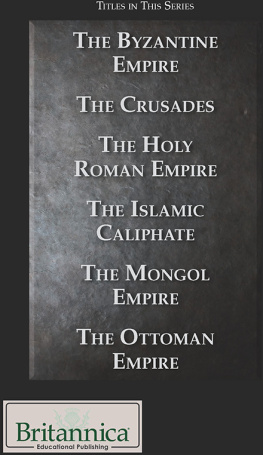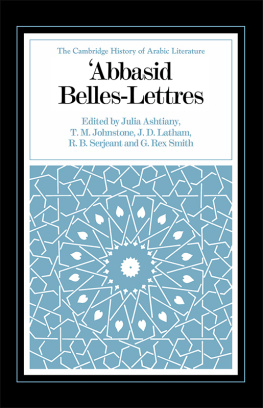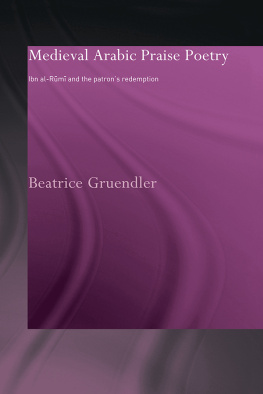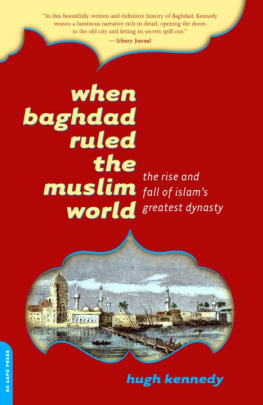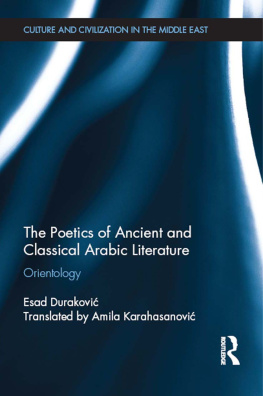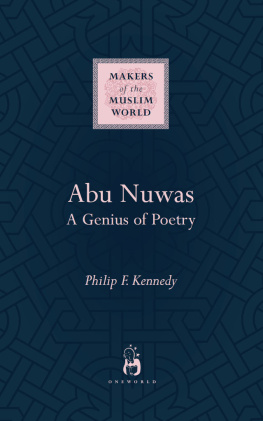Poems of Wine & Revelry
the khamriyyat of Abu Nuwas
In his khamriyyat, Abu Nuwas offers a glimpse of the hedonistic and dissipated world he inhabited: the world of Baghdad high society at the zenith of the Abbasid caliphate. Yet there is also a modern and up-to-date feel about his poetry that makes it ideal for presentation to an English-speaking readership, some twelve centuries after his death.
THE KEGAN PAUL ARABIA LIBRARY
EDITORIAL ADVISOR
PETER HOPKINS
THE SYRIAN DESERT
Christina Phelps Grant
THE TRAGEDY OF THE ASSYRIAN MINORITY IN IRAQ
R. S. Stafford
THE TRIBES OF THE MARSH ARABS OF IRAQ
Fulanain
THE VANISHED CITIES OF ARABIA
Mrs. Steuart Erskine
ARABIA AND THE ISLES
Harold Ingrams
STUDIES IN ISLAMIC MYSTICISM
Reynold A. Nicholson
LORD OF ARABIA: IBN SAUD
H. C. Armstrong
AVARICE AND THE AVARICIOUS
Abu Uthman Amr ibn Bahr al-Jahiz
TWO ANDALUSIAN PHILOSOPHERS
Abu Bakr Muhammad ibn Tufayl & Abul Walid Muhammad Ibn Rushd
THE PERFUMED GARDEN OF SENSUAL DELIGHT
Muhammad ibn Muhammad al-Nafzawi
THE WELLS OF IBN SAUD
D. van der Meulen
ADVENTURES IN ARABIA
W. B. Seabrook
A PALADIN OF ARABIA
NNE Bray
POEMS OF WINE & REVELRY
Jim Colville (translator)
THE ANTHROPOLOGY OF IRAQ
Henry Field
THE MANNERS AND CUSTOMS OF THE MODERN EGYPTIANS
Edward William Lane
SOUTHERN ARABIA
J. Theodore Bent
IRAQ
PhilipWillard Ireland
THE SAND KINGS OF OMAN
Raymond OShea
THE BLACK TENTS OF ARABIA
Carl S. Raswan
BEDOUIN JUSTICE
Austin Kennett
THE ARAB AWAKENING
George Antonius
ARABIA PHOENIX
Gerald De Gaury
HOW GREEK SCIENCE PASSED TO THE ARABS
DeLacy OLeary
SOBRIETY AND MIRTH
Jim Colville
IN THE HIGH YEMEN
Hugh Scott
ARABIC CULTURE THROUGH ITS LANGUAGE AND LITERATURE
M. H. Bakalla
IBN SAOUD OF ARABIA
Ameen Rihani
IRAQ FROM MANDATE TO INDEPENDENCE
Ernest Main
Poems of Wine & Revelry
the khamriyyat of Abu Nuwas
Translated from the Arabic and introduced
by
Jim Colville
First published 2005 by
Kegan Paul Limited
Published 2013 by Routledge
2 Park Square, Milton Park, Abingdon, Oxon OX14 4RN
711 Third Avenue, New York, NY 10017, USA
Routledge is an imprint of the Taylor & Francis Group, an informa business
Kegan Paul, 2005
All Rights reserved. No part of this book may be reprinted or reproduced or utilised in any form or by any electric, mechanical or other means, now known or hereafter invented, including photocopying or recording, or in any information storage or retrieval system, without permission in writing from the publishers.
ISBN 978-0-710-30957-0 (hbk)
British Library Cataloguing in Publication Data
Library of Congress Cataloging-in-Publication Data
Applied for.
CONTENTS
A bu Nuwas al-Hasan ibn Hani al-Hakami is widely acknowledged by the Arabs as one of their greatest perhaps the greatest non-classical poets. His talent was recognised by his contemporaries:
He seemed to be in sole possession of every poetic turn of phrase and, keeping what he needed for himself, left the remainder to everyone else.1
A master of all the major and minor genres, he is certainly the most versatile poet in Arabic. Fortunately, much of his dwn has survived. However, it is his poems on wine (khamryyt), homosexuality (mudhakkart) and ribaldry (majnyyt) for which he is best known and which have earned him lasting fame and notoriety as the bad boy of Abbasid poetry. Abu Nuwas is the lyricist of wine, the minstrel of homosexuality and the troubadour of ribaldry. What makes these compositions particularly vivid is that, more often than not, they seem to be a record of the poets own adventures:
Abu Nuwas brought the free-ranging talent to Arabic poetry; often strikingly vivid, his poetry abounds with pieces that are obviously inspired by the moment.2
This selection from his dwn concentrates upon the khamryyt, many of which might readily be likened to anacreontics.
Despite critical discomfort, Arabic literature has a distinguished tradition of wine poetry. The pre-Islamic poets sang openly of wine, and khamr was one of the more daring themes favoured in the early Islamic period by, among others, the poet and tenth Umayyad caliph, Walid ibn Yazid (d. 744). Abu Nuwas had many predecessors but none before or after produced verses in quality and quantity so consistently entertaining or explicit. Most critics consider his khamryyt to be the grand cru of the genre.3
The son of a soldier, apparently, our poet was born in Ahwaz, in the southwest of present-day Iran, perhaps around 756 (there is some doubt about the year of his birth and dates between 747 and 762 have been suggested). While still a young boy, he moved to Kufa, where he received a standard education in the Islamic sciences of Quran, Prophetic tradition, grammar and poetry. The louche poet, Waliba ibn Hubab, with whom he is said to have had the first of many homosexual relationships, was one of his teachers. This was followed by a spell in the finishing school of the desert, in the company of Bedouin, to polish his Arabic. He later moved to Baghdad, capital of the Abbasid caliphate, where he found favour with the Barmak family, the powerful imperial administrators at the court of Haroun al-Rashid (r. 786809). Following the demise of the Baramika in 803 and his return from exile in Egypt, he formed a friendship with Rashids son and successor, Amin. In the vintage years of Amins generous patronage, Abu Nuwas produced most of the poetry upon which his success and reputation rest. Amin was killed in 813 and Abu Nuwas died two years later in uncertain circumstances, perhaps a casualty of the chaos in Iraq that followed his patrons demise.
In his khamryyt, as in much of his other verse, Abu Nuwas provides a glimpse into the hedonistic and apparently dissolute world he inhabited: that of Baghdad high society at the zenith of the Abbasid caliphate. The Iraqi wine trade was then largely in Christian hands (with a smaller Jewish stake, too, in the business) and much of the action takes place in the grounds of monasteries outside the city, which seem to have had a lucrative sideline in the provision of amusements to a wealthy Muslim clientele.
Wine had been known in Mesopotamia since, at least, Sumerian times and the viniculture of early Abbasid Iraq was clearly sophisticated. Certain regions (Ana, Fallouja and Qutrabbul, for example) were renowned for the quality of their product. There was a marked Persian influence and Abu Nuwas references to the musky aroma of certain wines suggest the popularity of the Shiraz grape. Indeed, Abu Nuwas poetry generally reflects the ambience of a time in which Persian influences were making an increasing contribution to the development of Arab culture. It is, very definitely, poetry of the new Arab civitas. The wines appear to have been produced according to sound methods, as our poet often alludes to the process of maturing. It seems to have been common practice for drinkers to dilute their wine.


